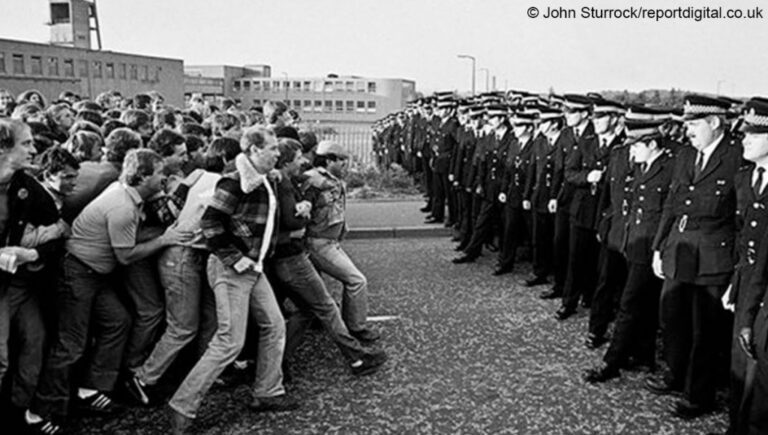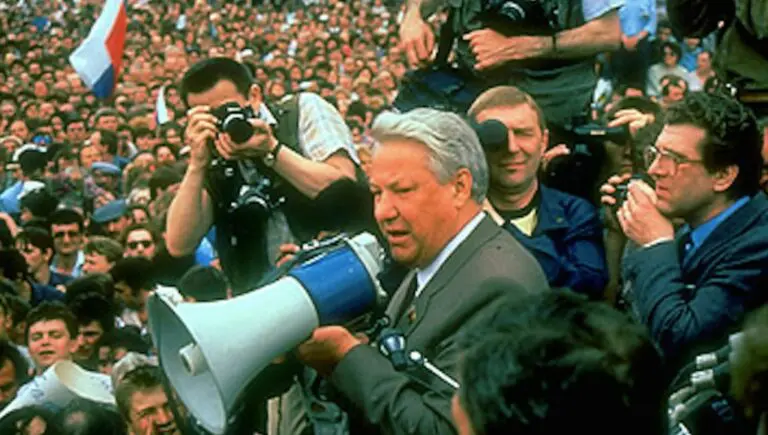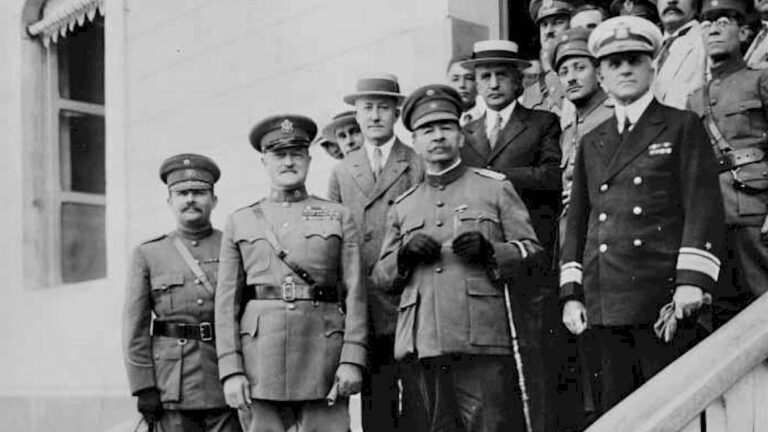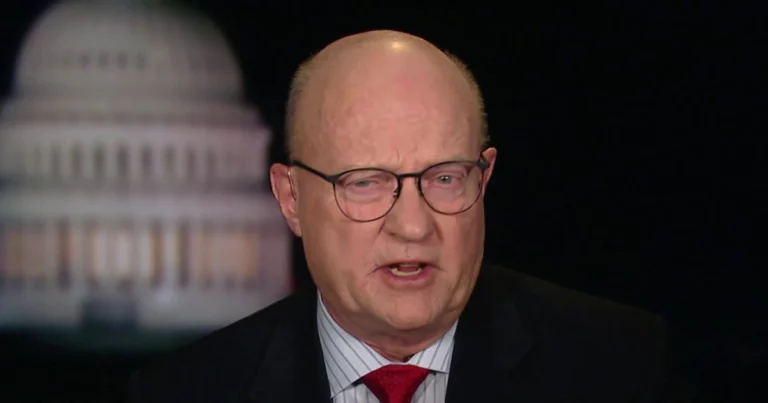Mr. Robock takes on many of the arguments against the thesis that CO2 produced by industrial society is the main contributor to global warming.
This is an episode of Reality Asserts Itself, produced May 4, 2014.
STORY TRANSCRIPT
PAUL JAY, SENIOR EDITOR, TRNN: Welcome back to The Real News Network. I’m Paul Jay. And welcome back to Reality Asserts Itself.
We’re interviewing Alan Robock, climate change scientist, meteorologist, and one of the–we were joking off-camera–one of the grandfathers of uncovering the role of human activity in the development of global warming and climate change. And he now joins us in the studio.
Alan is a distinguished professor of meteorology in the Department of Environmental Sciences at Rutgers University. He’s an editor of Reviews of Geophysics, the most widely read journal in the field. He was on the faculty of the University of Maryland, where he served as a professor, and the state climatologist of Maryland from ’91 to ’97. He was a lead author for the Intergovernmental Panel on Climate Change, which was awarded a Nobel Peace Prize in 2007. And his research focuses on geoengineering, climate effects of nuclear weapons, soil moisture variations, the effects of volcanic eruptions on climate, and the impacts of climate change on human activities.
Thanks for joining us again.
ALAN ROBOCK, LEAD AUTHOR, INTERNATIONAL PANEL ON CLIMATE CHANGE: Thanks for having me.
JAY: So, in the previous segments of the interview, we talked about your background and how you, you know, came to your own scientific conclusions that the evidence led you to human activity is the primary cause of climate change, the carbon emissions and such. So when you look at people who don’t agree with that–sometimes they’re called climate skeptics, sometimes they’re called climate deniers–are there any of the theories that they develop that are in fact challenging and make you–are more difficult for scientists like you to deal with?
ROBOCK: There are over 150 claims that claim that people are not causing global warming, and they are all misrepresentations and cherry picking of the data. So it’s not challenging to answer them; you just have to tell the truth and tell what we actually know.
JAY: Okay. I’m going to interrupt you just for one second, just to tell the audience.
Alan has agreed–’cause I know some of our viewers are going to be writing letters, well, what about this and what about that. And we’re going to collect the whats about this and whats about that, and we’re going to pose them to Alan and ask him to respond. So if you want to write in and challenge Alan in some way or the other, we will–in not-too-distant future he will respond to those questions.
So carry on.
ROBOCK: The one argument that I think gets the most traction is the claim that there’s no consensus on global warming, that scientists don’t agree on it. If you ask climate scientists, the ones that publish in the journals, the ones that do the research, the ones that understand the science, more than 97 percent of them agree that humans are the main cause of global warming. And so, by saying that other people who claim to be scientists don’t agree, or by having debates between one global warming denier and one climate scientist, it makes it seem like there’s a much stronger argument on the side of the deniers.
By the way, I’m a skeptic. To be a good scientist, you have to be skeptical of all the evidence, of all the model results of your own work, and always ask questions and challenge it. A good scientist is a skeptic. So I don’t like the word skeptic applied to to them.
JAY: Now, let’s just talk about some of the theories that seem to be most prevailing on the internet and otherwise now that counter the climate change scientists, which–I take your point. I mean, it seems like it’s–you know, what is it? More than 90, 95 percent of people who are actually in the field–or is it even higher than than that?
ROBOCK: I just said 97 percent. Yeah, yeah.
JAY: Ninety-seven percent, because a lot of the people that are on the other side actually aren’t in the climate science field.
ROBOCK: Right.
JAY: But let’s take–one of the theories goes kind of back to something you said earlier, that there’s various random factors that affect this. And one of them is cloud theory, for example, which I’m–have very little knowledge of. But the theory, if I understand it correctly, is that various–there are random variations in climate because of cloud.
ROBOCK: So there are multiple causes of climate change. There are things external to the climate system that change the amount of energy coming in to the planet. So if there’s a volcanic eruption, it reflects sunlight and it gets cooler. If the sun is a little bit less brighter, it gets cooler. If we pollute the troposphere, the lower part of the atmosphere, that reflects sunlight and it gets cooler. If we put greenhouse gases–carbon dioxide, methane–they trap energy and it gets warmer. Those are the external factors.
But there’s also weather, there’s also natural variability of the atmosphere. It’s chaotic. Sometimes–I mean, today it’s pretty warm in Baltimore. Why? It’s got nothing to do with global warming; it’s ’cause the wind is from the South, so it’s bringing warm air in from the south. A couple days ago, the wind was from the north and it was colder. So the wind direction and where the energy’s coming from changes your local weather. And these storms–the atmosphere is unstable. These storms develop and grow explosively, and then they die out. And so there’s a lot of natural variability of variation of the weather. And so we’re talking climate as sort of the envelope of this oscillation of the weather. With global warming, the envelope goes higher, so we’re oscillating within–we’re still oscillating, but it’s within a warmer envelope. So, for example, a day that’s very warm today will be the average day in the future, but there’ll still be some cold days and some more days.
And so one of the theories is, well, climate’s always varied, there’s natural causes, how can we trust that humans are causing the warming. And the answer is that we look at how it’s warmed in the past, and we try to explain what caused it. Why is it so much warmer now than it was 50 years ago? Every day isn’t warmer, but the global average is.
JAY: Now, one of the theories that’s talked about most is the solar activity, the activity of the sun.
ROBOCK: So we can measure how much energy is coming from the sun. We have satellites. We can measure it. There’s a solar cycle, 11-year solar cycle, which has a very small variation of about a tenth of a percent of the amount of energy from the sun, and we can quantify that. One of the reasons it didn’t warm as much in the last decade was ’cause the sun was a bit less bright. But if you compare that to the amount of energy trapped by greenhouse gases, it’s at least ten or 50 times less. So these small variations of the sun are superimposed as huge trapping of energy by greenhouse gases. You can’t explain the warming–and I did that for my dissertation 40 years ago. I thought maybe the sun was the cause of climate change. So I looked at all possible ways that solar variations could have explained the climate change of the past, and it turned out it wasn’t correlated, it wasn’t one of the factors. It’s a small factor, but it’s overwhelmed by these other factors.
JAY: Now, one of the–another argument I’ve heard often is that–I can’t remember the exact dates, but sometime during M edieval times I believe that there was another rise in temperature that came back down again, and that this shows that there are these kind of random up and downs that have nothing to do with industrialization.
ROBOCK: That’s true. Climate’s changed for the whole history of our planet, and humans have only been important for the last 100, 150 years. So we can look at the climate change of the last 1,000 years. About 1,000 years ago–it’s called the Medieval Climate Optimum. It was a little bit warmer than after that. And then there was the Little Ice Age, when it was colder. And now we’re coming out of the Little Ice Age. But now it’s much warmer that it was in Medieval times. And we can explain all of that climate change. The sun was gradually, slowly getting a little bit weaker, so that helps explain this 1,000-year trend. And there were these large volcanic eruptions. The biggest one was in 1257, the Samalas Volcano; in 1452, the Kuwae Volcano. And these blocked out the sun, had the ice sheets grow, the sea ice grow, and it just stayed for a while. So we can put these into our climate models, put in the volcano, put in the changes of all the causes, and we can do a very good job of explaining the climate change, except with the natural causes, except for the last 50 years. If you put in all the natural causes, [incompr.] get a very good explanation until the last 50 years. It would have been much colder than it is today if you didn’t include the effect of greenhouse gases. That’s why we’re convinced that greenhouse gases are the dominant cause, ’cause you just can’t explain the warming by any sort of natural variation.
JAY: Another argument is the models themselves are not reliable, that these are just computer models and not–and that you can’t project the future through these models.
ROBOCK: So these are the same computer programs we use to forecast the weather. When I was younger, I’d say I’m a meteorologist, and they’d say, you, you guys are always wrong, you get paid even when you’re wrong. And today I say I’m a meteorologist, and they say, is it going to rain tomorrow? The models keep getting better and better. But because of the chaotic nature of the atmosphere, beyond about two weeks you can never make perfect weather forecast. So–.
JAY: Because you can’t get your head around so many variables.
ROBOCK: Because small things that are happening now blow up. You get a thunderstorm where you didn’t know it was going to happen, and that disturbs the whole balance and you get a storm.
So people say to me, how can you forecast the climate when you can’t forecast the weather? So let me ask you. It’s spring now. Next summer, in July, is it going to be warmer or colder than it is now?
JAY: Yeah, we know.
ROBOCK: No, tell me. Is it going to get warmer or colder?
JAY: Than it is right now?
ROBOCK: Yeah.
JAY: In July?
ROBOCK: Yeah.
JAY: It’s going to be warmer.
ROBOCK: Okay. Is it going to rain on the 4 July?
JAY: I have no idea.
ROBOCK: Alright. You just made a climate forecast without being able to make a weather forecast.
JAY: Right.
ROBOCK: And that’s what we do. In July, it’s going to be warmer because the days are longer, the sun is more direct, and we have more energy, and that makes it warmer. But we still can’t forecast the individual days.
So climate models are imperfect, but we can test them by having them simulate what we have observed in the past. And they do a pretty good job of that. And so they–and they do a good job of explaining the warming that we’ve experienced for the last 50 years. And so we don’t know the future. There are no data about the future. What we do is we say, let’s take a scenario of human behavior. If we stop putting greenhouse gases in now and quickly move to solar and wind power, then there’ll be a little bit of warming, but there’ll be less–there wouldn’t be that much. If we continue business as usual and put that into our climate models, we’ll get a lot of warming. And because any model isn’t perfect, we ask all the scientists around the world to run their models and then we average them and we examine them. And then, when they all agree–and then we look at the average of them, and that gives us more of a consensus. If they didn’t agree, we’d be wondering. But if they agree, given the scenario this is how much warming we’re going to get, then we have more faith in them.
JAY: Okay. Another argument. It hasn’t warmed so much since about 1998–another argument one hears.
ROBOCK: Well, first of all, 1998 was a year with a big El Niño, a big warming of the Pacific Ocean, which put a lot of energy into the atmosphere. Nineteen ninety-seven and 1999 were much cooler than 1998. So it’s a trick to start with a very warm year and start a trend from there.
If we do a smooth trend, the warming of the planet has been a little bit slower over the last decade than it was before, but we understand why it was. There was an extended La Niña, which was a cooling of the ocean, which stopped energy going into the atmosphere. There were several small volcanic eruptions, which reflected sunlight. The sun was a little bit less bright. The troposphere was more polluted because of the industrialization in China and India. And you add all those things together, and each one takes away a little bit of energy, and that masks the effect of the continuing increase of greenhouse gases.
JAY: But wouldn’t more industrialization in India and China mean more carbon emissions? So it should have gotten worse.
ROBOCK: It does mean more carbon emissions. But the amount of carbon dioxide in the atmosphere is almost 400 parts per million. We’re talking about a change of less than 1 percent of the CO2 by their actions. But the lifetime of particles in the atmosphere is only a week, and so there’s a doubling of the amount of particles. So the net effect is more on the pollution than on the greenhouse gases. In fact, the pollution is really bad. It’s bad for health, it’s bad for breathing. If we clean up the air to make it more healthy for people, which I’m sure they will do in China as the people demand it, that’s going to cause a little bit more warming. That’s sort of ironic: you stop burning fossil fuels; for the short time, you get more warming. But in the long-term, you stop the buildup of CO2. But we can calculate the effect of all these, and I’m telling you what the net effect is of these.
JAY: Okay. Another argument. Antarctica is gaining, not losing ice.
ROBOCK: The continent of Antarctica is actually losing ice. The ice sheets on Antarctica are melting and going into the ocean. We can measure that. But the sea ice around Antarctica, the ice which is floating in the ocean, is not changing, even though the sea ice in the Arctic Ocean is rapidly decreasing. Why is that? Well, it turns out it has to do with whether there’s an ocean or a continent at the pole. In Antarctica, there’s a continent at the pole and there’s a strong current around Antarctica. When you produce global warming, it speeds up this current and it speeds up the amount of cold water coming up from below, and it counteracts the effect of the enhanced radiation, enhanced energy greenhouse gases. And climate models tell us about that. So it’s a delayed reaction in Antarctica, whereas in the Arctic there’s no effect on the atmospheric–on the ocean’s circulation. It’s just sort of melting the ice that’s sitting there. So the models give us that asymmetry. And what the models tell us is that soon the ice around Antarctica is going to start melting, too.
JAY: So one can go on. There’s, I think you said, 150 of these kinds of arguments.
ROBOCK: Yeah, I could answer all of those, yeah.
JAY: And I think at some point we should, we should actually, you know, go through a few of them. And we’ll do that, probably, at another time.
But if one looks at the politics now about trying to–and you explained this to me, the difference between mitigation and adaptation. If you look at the way the political process is working in almost the entire world, there’s not a heck of a lot being done to really in a serious way reduce carbon emissions, and there’s very little done–and I understand that’s–I should be using the word mitigation there–and then adaptation, there’s not a heck of lot of planning going on. The countries of Asia, Africa, and Latin America have been screaming, and the Caribbean particularly, screaming about getting ready to help them adapt to the coming consequences, and they’re not getting much support. So if the politics doesn’t change, if what we’re looking at is a continuing paralysis around really effective policies to reduce carbon emissions, what does the next 50, 60 years, 70 years look like?
ROBOCK: There’s a lot of questions there.
JAY: Yeah.
ROBOCK: So, first of all, it’s not true that mitigation is not taking place. Look at Germany. Germany has solar panels, windmills, and they’ve really reduced their CO2 emissions. Even the United States. CO2 emissions in the United States are steady or slowly going down. They aren’t going up anymore. It’s China and India where it’s–China emits 50 percent more CO2 per year than the United States does, and they only passed us, you know, a few years ago. So there is mitigation that’s going on. It’s not going on fast enough. I mean, that’s the solution. It’s not going on really fast.
JAY: But that’s kind of what I meant. If you look at the kind of targets that a lot of scientists are saying should be met, current policies are not really going to meet those targets.
ROBOCK: That’s right. That’s right. So I’m actually optimistic that we’ll be able to solve this problem. You know why? We worry about tipping points in the climate system, that at some point all the methane’s going to be released and we’re going to have drastic warming or there’s going to be catastrophic collapse of the Greenland ice sheet. But there are tipping points in human behavior, too. Just think. Ten years ago, who could have imagined gay marriage, legalized pot, a black president? These are huge changes in the way society behaves, in the way people take as a consensus.
JAY: But not so hard in the sense that it doesn’t change the fundamental way the society does business. This doesn’t change who owns stuff. It doesn’t change, you know, who has political power. Those things, while they were socially controversial, they don’t fundamentally change, you know, the relationships of money and power.
ROBOCK: Well. So you need–.
JAY: And it seems to me, if you’re going to really address serious reductions of carbon emissions and really help those places adapt that are going to get really slammed, you need to change issues of who has money and who has power.
ROBOCK: Yeah. So, first of all, adaptation used to be sort of unpopular or stigmatized, because if you work on adaptation, that means you’ve given up on mitigation. Now the consensus is we’ve got to do both: we’ve got to do mitigation and we have to work on adaptation, ’cause there’s going to be a certain amount of climate change no matter how much mitigation we do.
JAY: But let me rephrase my question. If we don’t get to your tipping point–’cause we’ll save that for the last segment, your optimism–I want to go–if we don’t get a tipping point in the balance of power about how urgent this is and so on for quite some time–I take your point. There’s got to be some day where it gets bad enough that there probably will be some kind of tipping point. But if there isn’t in the next 20, 30 years, say, a really significant change in the way we do business, what does it look like?
ROBOCK: It doesn’t look good. And the problem is that this is a long-timescale thing. If you take actions now to put solar panels on your roof and you make sure that you put on wind turbines and you stop burning coal and you don’t do the Keystone pipeline and you leave all the fossil fuels in the ground, what do you get for it right now in the short term? All you get is cost. You don’t see any impact on the climate. If you turn off a dirty smokestack, the next day the air is clean. If you stop putting in CO2–there’s CO2 between you and me right now, but it’s invisible. You can’t see it, and it takes a long time for the climate system to respond. The ocean takes a long time to warm up and cool off. It takes a long time even to retrofit our energy structure to move away from putting CO2 in the atmosphere, using the atmosphere as a sewer for our CO2 with no charges. So, yeah, it’s really hard. You’ve got to convince people to believe in the theory of global warming and take actions now that will benefit their children and grandchildren. That’s what makes it such a hard political problem.
JAY: Now, we’ve been told the increasing 2 degrees over what the average global temperature was before industrialization, if we hit this 2 degree it’s, like, a watershed moment. But I’m hearing people say that it could well, the way we’re headed, go more than 2 degrees.
ROBOCK: Oh, we’ll definitely get more than 2 degrees unless we take rapid action right now. If we want to leave it at 2 degrees, we’ve got to start yesterday in terms of–.
Now, I live in New Jersey. I have solar panels on my roof. The state of New Jersey paid for more than half of them. The electric company is required to buy renewable energy certificates. So I make money on the deal because it was subsidized and because that was the policy of the state. And our current governor sort of isn’t on board, but in the past it was a very–and New Jersey has more solar panels per person than any other state in the country, and more absolutely than any state except for California. So I’ve learned that you can make changes if it’s government policy. But New Jersey did it because there is no federal policy.
JAY: And right now there’s still–there’s very weak, should we say, federal policy.
ROBOCK: Yeah, I mean, as Obama is trying to do things that he can do by executive action that doesn’t require Congress to agree. So the EPA–fortunately, the U.S. Supreme Court agreed that carbon dioxide is an air pollutant, and according to the Clean Air Act, you can restrict CO2 emissions. And so that’s being done. They’re restricting CO2 emissions from power plants, from stationary sources, and they’ve required that vehicles, now trucks, too, really rapidly increase their efficiency so they put out less CO2. And so there are things that are happening.
But it would really need a draconian change and agreement to quickly change our source of energy. And the people that are making a lot of money from it right now resist.
JAY: Okay. We’re going to–in the final segment, which is not the next segment, we’re going to go back to kind of the big picture and your sense of optimism. But in the next segment, we’re going to talk about nuclear winter and the real threat of what even a small use of nuclear weapons might mean to the climate and to the earth.
So please join us for the next segment on Reality Asserts Itself with Alan Robock on The Real News.










